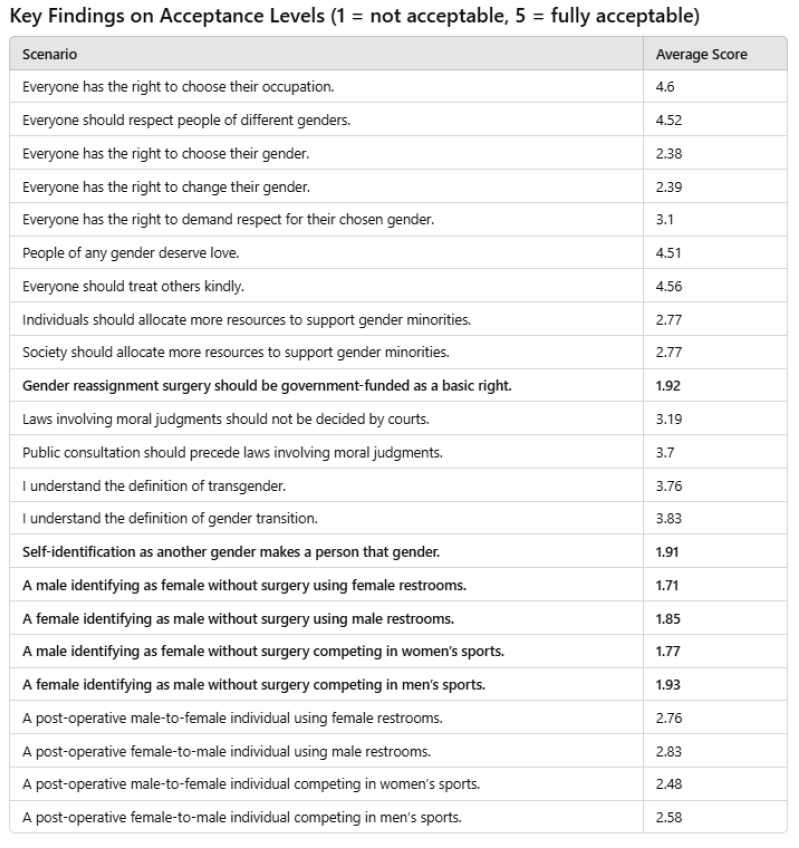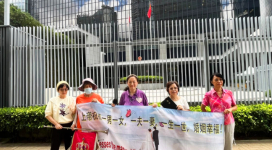
A 2024 survey from the Society for Truth and Light (明光社)'s Center for Life and Ethics Research reveals that respondents from various backgrounds prioritize personal safety and fairness when it comes to transgender issues. When laws involve moral judgments, most respondents believe courts should not make the decisions. The study also indicates that religious believers share similar views with non-religious respondents, reflecting that many churches may rarely address gender topics in depth.
Research Brief
The Center for Life and Ethics Research conducted a study titled Perceptions and Acceptance of Transgender People. Professor Lee Shu-kam (李樹甘), director of the Center for Business, Economic, and Public Policy Research at Hong Kong Shue Yan University (樹仁大學), analyzed the results. The study employed a quantitative approach using online surveys and snowball sampling. Data collection took place from December 13, 2023, to May 31, 2024, with 789 valid responses.
Respondent Demographics:
- Gender: 43.6% male, 56.4% female.
- Age: 16.48% were 18-25, 20.91% were 26-45, 52.34% were 46-65, and 10.27% were 66 or older.
- Education: 49.56% held an associate or bachelor’s degree, and 30.93% had a master’s degree or higher.
- Marital Status: 36.76% were single, and 59.06% were married.
- Children: 51.71% had no children, while 48.29% had children.
- Employment: 49.62% were employed full-time, and 15.61% were students.
- Religion: 79.21% identified as Christians, 4.69% as Catholics, and 13.69% had no religious affiliation.
- Familiarity with Transgender Individuals: 11.53% knew transgender people, while 88.47% did not.

Respondents generally demonstrated an understanding of transgender and gender transition concepts, with average scores of 3.76 and 3.83, respectively. There was strong agreement with universal human rights principles, including the right to choose an occupation (4.6), respect for all genders (4.52), and kindness toward others (4.56). However, acceptance of fundamental transgender rights, such as the right to choose or change one’s own gender, scored lower (2.38 and 2.39). When it comes to the use of public resources and money for the protection of the sexual minorities, there are also some reservations. Respondents were most against using public funds for gender reassignment surgeries (1.92) and the validity of recognizing gender based solely on self-identification (1.91).
Respondents prioritized personal safety, finding it less acceptable for male-to-female transgender individuals who had not undergone full gender-affirming surgery to use female restrooms (mean score: 1.71) compared to female-to-male transgender individuals using male restrooms (mean score: 1.85).
Additionally, respondents appeared to consider fairness when evaluating participation in sports. Male-to-female transgender individuals with incomplete gender-affirming surgery received a mean score of 1.77 for participating in women’s fitness-related sports, while female-to-male transgender individuals with incomplete surgery received a mean score of 1.93 for participating in men’s sports. In both cases, acceptance was lower for those with partial surgery compared to those who had completed gender-affirming surgery. Specifically, male-to-female transgender individuals with completed surgery scored 2.48 for participation in women’s sports, and female-to-male transgender individuals with completed surgery scored 2.58 for participation in men’s sports.
Despite agreeing that all people have fundamental human rights, based on the analysis of the results, two key inferences for transgender rights evaluation can be drawn: personal safety and fairness, with different considerations for those who have completed all sex/gender reassignment surgeries or those who have not.
For female-to-male individuals who underwent partial gender-affirming surgery but retained the uterus and other female reproductive organs, successfully conceiving and giving birth to a child, most respondents were more likely to accept the term "mother" to describe the person who gave birth. The idea of referring to a transgender person who gave birth as a "father" received lower acceptance, following traditionally accepted gender roles.
Before conducting this study, researchers hypothesized that factors such as faith, parenthood, and profession would significantly influence views on transgender issues. However, these factors had limited impact. Despite a Christian-majority sample (79.21%), religious beliefs did not markedly shape opinions. Both believers and non-believers yielded similar results. However, it is not clear whether this indifference is caused by the lack of discussion in the Hong Kong church on the subject of sexuality. In any case, the church and society should give the congregation and the public a chance to discuss the issue, rather than avoiding or shying away from it.
Due to length limitations, this research did not address the issue of incomplete sex or gender reassignment surgeries. However, a review of cases involving the legal status and marriage of transgender individuals in Hong Kong over the years shows that courts have defined the terms "transsexual" and "transgender" for the community, influencing public acceptance of these terms.
According to this study, respondents gave an average rating of 3.19 to the statement that "legislation involving moral judgment should not be decided by the court" and 3.7 to the statement that "legislation involving moral judgment should be subject to public consultation." These findings suggest that the public is open to broader discussions and that decisions regarding transgender marriage and related issues should undergo more public debate before being finalized.
*This article is a revised translation of the press release published by thr Society for Truth and Light’s Center for Life and Ethics Research.







